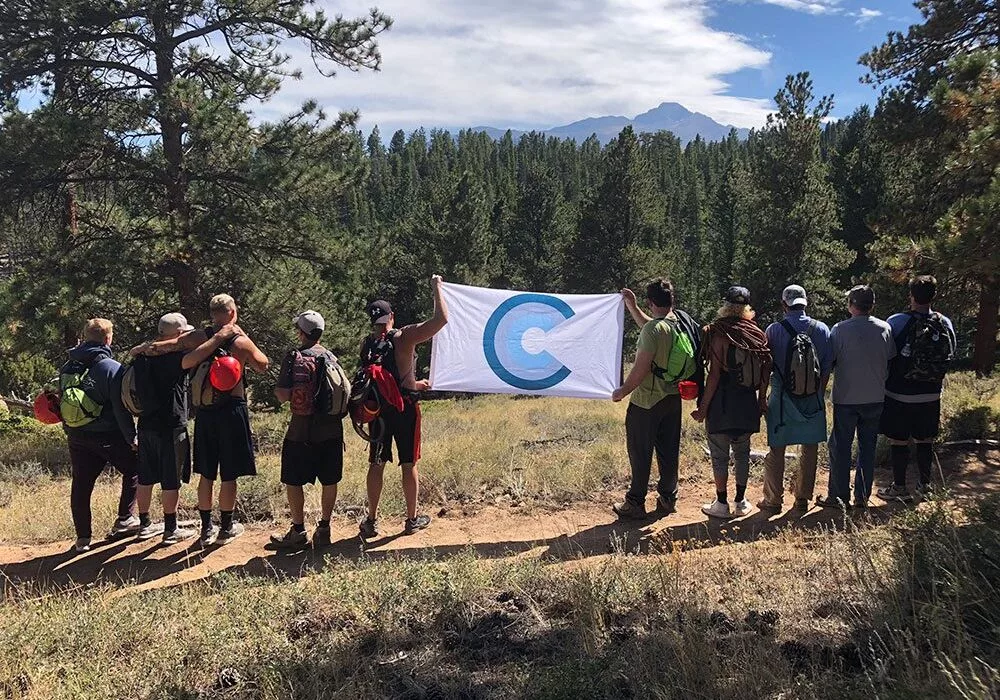H.E.R.D. Transitional Living Program in Boulder, CO
Colorado’s Entry Program To Transitional Housing
H: Honest Assessment
E: Experience Community
R: Recovery Capital
D: Demonstrate Principles
Preliminary H.E.R.D. Program Outline
ABOUT H.E.R.D.
H.E.R.D. is a foundational program for Transitional Living and a step closer to dependence-free of substances. It is a guiding philosophy representing Choice House’s unwavering commitment to fostering men transforming within our community into Choice House’s Phase II with supportive and stable living.
Bison thrive in close-knit herds, relying on safety and support as they navigate life’s trials together. Resembling the bison, we encourage our men to approach life’s challenges with purposeful determination. The H.E.R.D. program at Choice House inspires individuals to cultivate individual resilience and group unity on their path to recovery.
With the mission of creating a resilient community that uplifts and supports each other, H.E.R.D. starts with the cultivation of personal skills and tools, not only for individual growth but also to assist individuals in becoming a source of maximum usefulness to others.
In the spirit of the bison, let’s stride boldly, knowing that within these challenges lies the strength to thrive personally and as a united community.

What H.E.R.D. Means?
H: Honest Assessment
Individuals can assess their strengths and difficulties through continual attendance and active participation in H.E.R.D. Therefore having a clear road map for the journey ahead in Phase II.
E: Experience Community
H.E.R.D. offers structured adventure-based programming that challenges participants and builds a sense of community. With consistent engagement, individuals establish a culture of accountability and vulnerability with their peers. This adds the value of strengthening bonds during recovery.
R: Recovery Capital
Central to H.E.R.D. is the cultivation of an individual’s recovery capital. Through facilitated assessments and coaching, clients identify the aspects of their lives that best serve their recovery goals. H.E.R.D. empowers individuals to build the resources necessary for a successful journey.
D: Demonstrate Principles
By fully engaging in Phase II programming and embracing the foundation H.E.R.D. provides, individuals can demonstrate their skills, community connections, and commitment to recovery. Graduating from H.E.R.D. programming means being ready to serve the Choice House community and make a lasting impact.

Tentative Program Schedule

Requirements & Expectations
Participants must successfully meet all guidelines of Phase II programming, demonstrating their commitment to the recovery process.
Program Implementation: Clients who currently do not hold a job or are in their initial month of Phase II must attend.
For clients who have met all H.E.R.D. program requirements, attendance is optional. However, the team may recommend specific groups or H.E.R.D. activities if they believe they would benefit the individual, and in such cases, attendance may be required even if initial requirements have been met.
To complete the H.E.R.D. program, participants must meet the following criteria:
- Phase II Commitment: The individual must have been actively engaged in Phase II programming for a minimum of two weeks.
- 12-Step Meeting Attendance: A minimum attendance of four of seven days of four 12-Step Meetings each week is required to ensure active participation in the recovery community.
- Sponsor Meetings: Maintaining regular sponsor meetings is essential for ongoing support and guidance in the recovery process.
- Commitment to Work, School, or Volunteering: Participants are expected to have secured a part-time commitment to work, school, or structured volunteering to foster personal growth and responsibility.
- IOP Groups and Individual Sessions: Attending all Intensive Outpatient Program (IOP) group sessions and individual therapy and case management sessions are necessary for comprehensive recovery support.
- Room Cleanliness and House Chores: Demonstrating responsibility and respect for the shared living environment by maintaining optimal room cleanliness and actively engaging in house chores.
- Community Involvement: Active participation and involvement within the peer group and the broader recovery community showcase a commitment to unity and support among peers. This includes attending the Wednesday Alumni dinner, supporting peers, and engaging respectfully with all staff and peers.
Meeting these completion requirements signifies a strong commitment to personal growth and recovery, ensuring that participants have actively embraced the H.E.R.D. program and are well-prepared to serve the Choice House community and make a lasting impact.
Extension of the H.E.R.D. Program
When a participant does not meet the two-week curriculum, extending H.E.R.D. programming with a focus on addressing the specific requirement(s) is a constructive approach.
Extension Period for Unmet Requirements:
- Individual Assessment: When a participant does not meet the specified requirements within the initial two-week curriculum, they should undergo individual assessment with their Case Manager. This assessment aims to identify the specific area(s) where the participant requires additional support or improvement.
- Customized Extension Plan: Based on the results of the individual’s assessment, an adaptive extension plan is created for the participant. This plan outlines the additional time needed in the H.E.R.D. program and focuses on using group sessions to address the unmet requirement(s).
- Group Support: During the extension period, the participant continues to engage in H.E.R.D. group activities while also having staff pivot: dedicating specific sessions to address their unmet requirements. For example, if the participant did not secure part-time employment, a portion of group time may be allocated for job search, resume building, and interview preparation.
- Regular Progress Monitoring: Regular check-ins and assessments in progress are conducted to ensure that the participant is actively working on and progressing towards meeting the requirements. Adjustments to the extension plan can be made as needed based on their progress.
- Completion Review: Once the participant has successfully met all program requirements, another review is conducted to ensure compliance. When the participant has received an approved completion of the extension period and met all requirements, the participant can then graduate from the H.E.R.D. Program.
By implementing this extension period with a focus on addressing specific requirements during group time, participants are allowed to catch up and build the necessary skills or commitments required for completion. This approach ensures that everyone receives the support they need to succeed in establishing their Phase II journey within the H.E.R.D. program.
Daily Program Outline
8:30 AM: Wake-up & Morning Routine: Participants begin their day with personal responsibilities like making beds, having breakfast, showering, and engaging in house chores, setting the foundation for a productive day.
9:00 AM: Final Morning Check-In: Participants who are not yet out of bed and engaged in their morning routine receive additional support and accountability to join the program.
9:30 AM: Meditation and Goal Setting: Led by a facilitator, a ten-minute silent meditation session is followed by participants sharing their progress on the previous day’s intentions and setting actionable and reportable goals for the current day.
10:00 AM: Group Activity & Lesson: Facilitator presents a session that aligns with the H.E.R.D. mission, engaging participants with relevant resources and activities. (Life Skills, Resume Building, Personal Assessment Tools, Etc.)
10:45 AM: Short Break
10:55 AM: Individual/Dyad Focus Time: Participants devote the last half-hour to work on group or case management action items individually or in pairs. Additionally, at this time individuals who struggled to take care of wake-up activities are provided additional support from staff.
11:30 AM: End of Morning Session
GROUP IDEAS:
Recovery Capital:
Content: Exploring the concept of recovery capital, which includes personal, social, and community resources that support recovery.
Participants assess their own recovery capital and identify areas for growth.
Ideas: Guest speakers sharing their experiences, Goal-setting exercises, resource identification, and action planning.
Distractions in Recovery:
Content: Discussing common distractions and challenges that individuals in recovery may face, such as triggers, stressors, and self-medicators. Strategies for managing and overcoming these distractions are explored.
Ideas: Mindfulness techniques, psychoeducation, coping strategies, and group discussions on real-life distractions.
Life Skills:
Content: Focusing on essential life skills needed for independent living and successful recovery, such as budgeting, time management, communication skills, and stress management.
Ideas: Budgeting workshops, daily living tools and techniques, role-playing scenarios for effective communication.
Job/Resume Workshop:
Content: Assisting participants in their pursuit of employment or education. This includes resume building, job search strategies, interview preparation, and career goal-setting.
Ideas: Mock interviews, resume reviews, and networking opportunities.
Common Welfare:
Content: Exploring the concept of service and giving back to communities as a part of recovery. Participants learn the importance of selflessness and community involvement.
Ideas: Volunteering opportunities, discussions on community impact, and service projects.
Time Management:
Content: Teaching effective time management techniques to help participants balance various aspects of their lives, from personal responsibilities to recovery activities.
Ideas: Time management tools, prioritization exercises, and creating personalized daily schedules.
call choice house in colorado today!
To help the men who entrust their recovery to Choice House develop an unshakable foundationthat guides their journey to freedom, personal growth, and lasting sobriety.
Choice House Long-term Sobriety Program
Phase I: 90-Day Residential Treatment (The Lookout)
Phase II: 4-Month Transitional Living Program (Sober Living with Clinical Services)
- 1st two weeks of Phase II (H.E.R.D. Program)
Phase III: Structured Sober Living (Step-Down Program)






